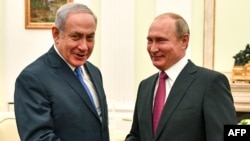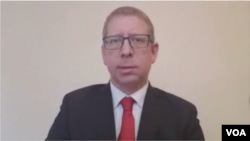An Israeli official says Prime Minister Netanyahu’s latest meeting with Russian President Vladimir Putin ended with Putin expressing understanding for Israel’s call for Iranian forces to be ejected from Syria.
In a Thursday interview with VOA Persian from Moscow, Netanyahu’s Arab media spokesman, Ofir Gendelman, said Russia “understands” Israeli concerns about the Iranian military presence in Syria. Netanyahu, who met with Putin in the Russian capital the previous day, told reporters before departing that he will not tolerate Iranian forces near the Israeli-occupied Golan Heights or anywhere in Syria.
Iran describes its military support for Syrian President Bashar al-Assad and Iranian-allied militant groups in Syria as part of an “axis of resistance” against Israel, whose destruction Tehran long has called for.
Israel, Russia relations 'very close'
Gendelman said Israeli relations with Russia are “very close” after what was the ninth meeting between Netanyahu and Putin in the last three years.
“There is continuous military cooperation between our military and the Russian military in Syria,” Gendelman said. “Nobody wants the conflict in this region to escalate further, and we all know that the Iranian regime plays a pivotal role in destabilizing it. This is why, in order to advance peace and security, we have to curtail Iranian aggression in Syria and elsewhere in the region.”
The Israeli and Russian militaries have been using a coordination mechanism to prevent potential clashes in Syria between their forces since 2015. Russia has stationed troops in Syria, a key regional ally, for decades.
'No problem with Assad regime'
In his briefing with reporters Thursday, Netanyahu said Israel has no intention to interfere in Syria’s civil war, either for or against Assad.
“We had no problem with the Assad regime. For 40 years, not a single bullet was fired in the Golan Heights (against Israel),” he said. Israel captured the western part of Golan Heights from Syria in 1967 and repelled Syrian forces that tried to take it back in 1973, when Bashar Assad’s late father, Hafez Assad, led the country.
The Israeli-Syrian cease-fire line in the Golan Heights had been quiet until recent years when occasional spillovers from the Syrian civil war began occurring. Israel routinely has retaliated for such incidents with cross-border strikes, as it did Wednesday when it attacked several Syrian military positions hours after shooting down what it said was a Syrian drone that entered Israeli airspace. Israel has insisted on a right to act freely in Syria against any perceived threat.
Israel also said it carried out several strikes on Iranian forces in Syria this year in response to Iranian rocket fire and an Iranian drone infiltration from Syrian territory. Iran denied responsibility for the drone and made no comment on the rocket fire. But Israel has declined to comment on Syrian reports of other suspected Israeli strikes targeting Iranian-allied militant group Hezbollah in Syria in recent years.
Several Israeli news outlets reported Thursday that Russia has been working to push Syria-based Iranian forces away from the Israeli-occupied Golan Heights. But it is not clear if Russia will press Iran to remove those forces from Syria completely as Israel has demanded. Russian state media reported no comment on that issue following the Putin-Netanyahu meeting.
This report was produced in collaboration with VOA’s Persian Service.





